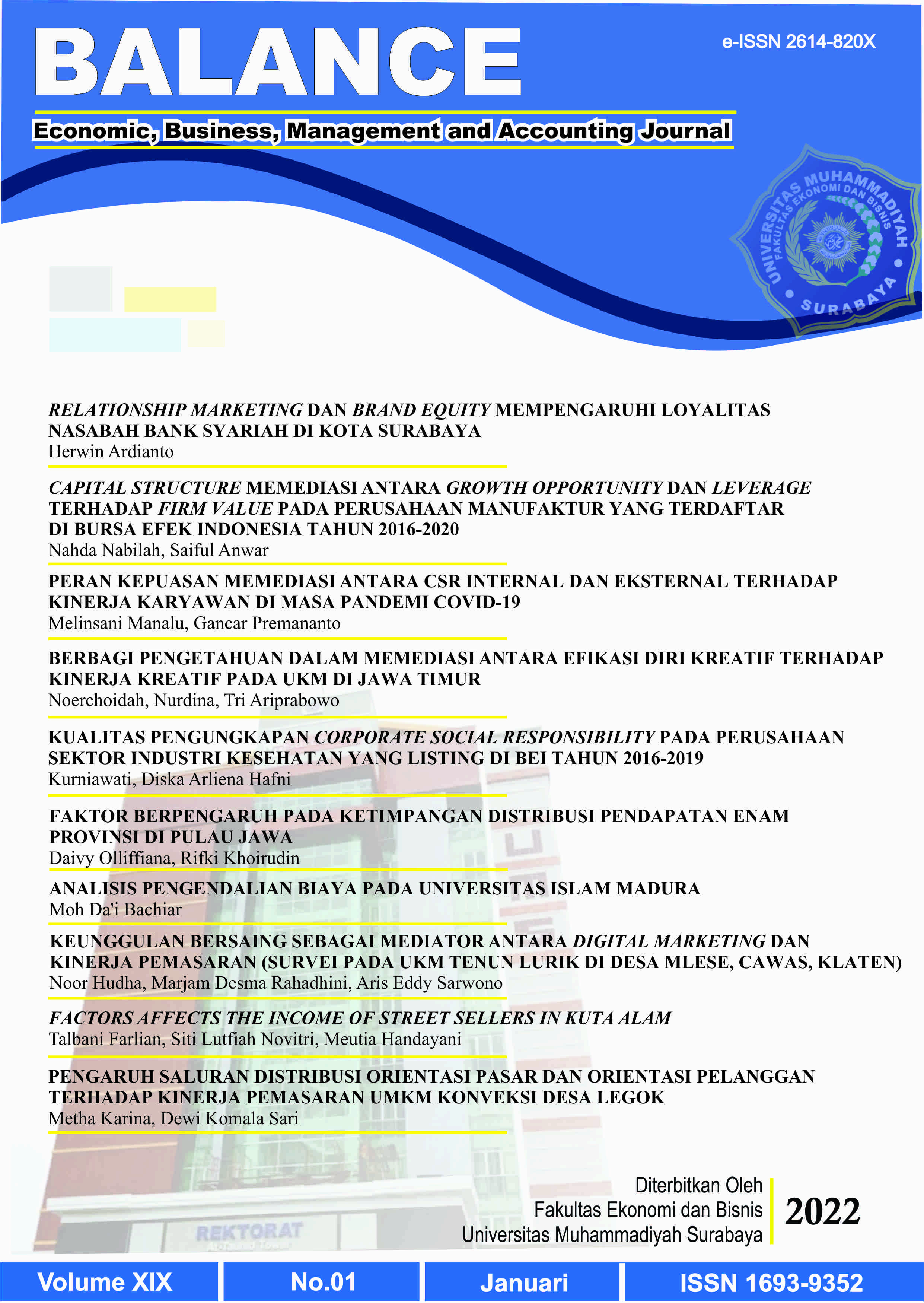Faktor Berpengaruh pada Ketimpangan Distribusi Pendapatan Enam Provinsi di Pulau Jawa
DOI:
https://doi.org/10.30651/blc.v19i1.8738Abstract
Development aims to improve the welfare of the people. To improve welfare, it requires economic growth that is quitte high, stable and equiable in income. High enough economic growth must be balanced with equity, so as not to create ineqalty. Growth is not a goal, but only a tool as a process to reduce proverty and redurce inequality in income distribution. Hence the reduction of inequality ofincome distribution is the essence of development results can be enjoyed fairly and equitably by all people, the problemof unequal income distribution will not arise. If the economic proformance is betteror is experiencing progress, then all people must also feel the impact of this progress in the form of an increase in the level of income. Because the distribution of income is very useful in increasing economic growth and development,it is important for us to know whar factor affect in the inequality of income didtribution in Java. This variables used are econoc growth, provincial minium wages , open employment rate, ddegree of fiscal decentralization and growth in the human development index with multiple regression analysis for 2014-2019. The results showed that the only variables affecting income inequality were the provincial minimum wage and the open unemployment rate. The open unemployment rate variable has a coefficient value of -0.0502438. This means that when the exchange rate increases by Rp.1, income inequality will decrease by 0.0502438%. The open unemployment rate variable has a coefficient value of 0.0056812. This means that when the open unemployment rate increases by one percent, income inequality will increase by 0.0056812%. Meanwhile, economic growth, the degree of fiscal decentralization and the human development index have no effect on income inequalityReferences
Abdulah, R. (2013). Faktor-Faktor Yang Mempengaruhi Ketimpangan Pendapatan Di Jawa Tengah. Jurnal Ekonomi dan Kebijakan, 6(1), 42-53, ttps://doi.org/10.15294/ jejak.v6i1.3747
Arsyad, L. (2010). Ekonomi Pembangunan. Yogyakarta: UUP STIM YKPN.
Boediono. (1992). Teori Pertumbuhan Ekonomi. Yogyakarta: BPEE.
Badan Pusat Statistik (2014). Indeks Pembangunan Masyarakat 2013. Jakarta-Indonesia: Publikasi Badan Pusat Statistik.
Damanik, M.A., Zulgani dan Rosmeli. (2018). Faktor-Faktor Yang Mempengaruhi Ketimpangan Pendapatan Melalui Pertumbuhan Ekonomi di Provinsi Jambi. Jurnal Perspektif Ekonomi dan Pembangunan Daerah, 7(1), 15-25.
Faridah, N. dan Syechalad, M.N. (2016). Analisis Faktor-Faktor Yang Mempengaruhi Nilai Tukar Petani Sub Sektor Tanaman Pangan Padi Di Aceh. Jurnal Ilmiah Mahasiswa Ekonomi Pembangunan Fakultas Ekonomi dan Bisnis Unsyiah, 1(1), 169-176.
Kuncoro, M. (2006). Ekonomika Pembangunan: Teori, Masalah dan Kebijakan, Edisi Keempat. Yogyakarta: UPP STIM YKPN.
Kurniasih, E. P. (2013). Ketimpangan Wilayah di Provinsi Kalimantan Barat Suatu Kajian terhadap Hipotesis Kuznet. Jurnal Eksos. 9(1), 36–48.
Reza, M., Jamal, A., dan Zulham, T. (2019). Analisis Ketimpangan Pembangunan dan Distribusi Pendapatan Wilayah di Provinsi Aceh. Jurnal Ekonomi dan Kebijakan Publik Indonesia, 6(1), 17-32. https://doi.org/10.24815/ekapi.v6i1.14256
Rosa, Y.D. dan Sovita, I. (2016). Analisis Faktor-Faktor Yang Mempengaruhi Ketimpangan Distribusi Pendapatan Di Pulau Jawa. Jurnal Menara Ekonomi, 2(4), 41-52.https://doi.org/10.31869/me.v2i4.238
Soediyono. (1992). Teori Ekonomi Mikro Pengantar Analisis Pendapatan Nasional Yogya. Yogyakarta: Liberti.
Sukirno, S. (2000). Makro Ekonomi Modern: Perkembangan Pemikiran Dari Klasik Hingga Keynesian Baru. Jakarta: PT Raja Grafindo Persada.
Sukirno, S. (2006). Makroekonomi: Pengantar Ekonomi. Jakarta: PT Raja Grafindo Persada.
Todaro, M. (2006). Pengembangan Ekonomi Dunia Ketiga. Jakarta: Erlangga.
Tulus T.H Tambunan, 2011. Perekonomian Indonesia: Kaian Teoritis dan Analisis Empiris. Bogor: Ghalia Indonesia.
Undang-Undang Republik Indonesia Nomor 32 Tahun 2004 Tentang Pemerintah Daerah.
Yurianto, Y. (2020). Analisis Kebijakan Pengendalian Inflasi DKI Jakarta. BALANCE: Economic, Business, Management and Accounting Journal, 17(1), 12-33.















